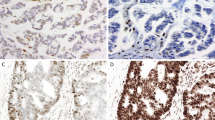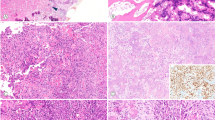Abstract
Microsatellite instability has recently been reported in sporadic and familial colorectal tumours and can be due to defects in DNA mismatch repair genes. Such instability has subsequently been detected in several other types of sporadic tumours. We studied 29 specimens of bone tumours with different histopathological diagnoses and found no evidence of microsatellite instability. Our results suggest that mismatch repair defects are unlikely to play a significant part in the tumorigenesis of bone neoplasms. Loss of heterozygosity with at least one marker was detected in 11, i.e. in 38% of the tumour samples, most frequently with markers D2S136 at 2p (eight of 28 informative specimens, 29%) and D11S904 at 11p (four of 21 informative specimens, 19%).
This is a preview of subscription content, access via your institution
Access options
Subscribe to this journal
Receive 24 print issues and online access
$259.00 per year
only $10.79 per issue
Buy this article
- Purchase on Springer Link
- Instant access to full article PDF
Prices may be subject to local taxes which are calculated during checkout
Similar content being viewed by others
Author information
Authors and Affiliations
Rights and permissions
About this article
Cite this article
Tarkkanen, M., Aaltonen, L., Böhling, T. et al. No evidence of microsatellite instability in bone tumours. Br J Cancer 74, 453–455 (1996). https://doi.org/10.1038/bjc.1996.380
Issue Date:
DOI: https://doi.org/10.1038/bjc.1996.380
This article is cited by
-
Microsatellite instability in Ewing tumor is not associated with loss of mismatch repair protein expression
Journal of Cancer Research and Clinical Oncology (2007)
-
Microsatellite alterations in various sarcomas in Japanese patients
Journal of Orthopaedic Science (1999)



